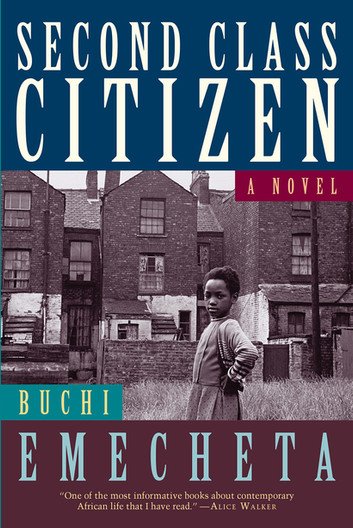I read the Joys of motherhood a long time ago. It was my brother's literature in school. However, i just did not take to memory the name of the author. When I got to reading this book, Second class citizen, I sort of had the feeling that I had read something in same voice but i wasn't sure what. It was only until i read reviews online and found her, Buchi Emecheta, to be the author of both, as well as other amazing works that it all came together. Not to forget the similarity in how sadly her books end.
Second Class Citizen is possibly one of her best work. It is the poignant story of a resourceful Nigerian woman who overcomes strict tribal domination of women and countless setbacks to achieve an independent life for herself and her children.

Second Class Citizen follows the life of Adah, a young, Igbo, ambitious and educated Nigerian girl who emigrated from Nigeria to London seeking for better opportunities for her young family. While in Nigeria, Adah lived though the disintegration of her first family — Pa, her father who died after a brief illness; her mother who was auctioned off to her late father’s brother; Boy, her only brother who went to live with another family member while she tagged along with her uncle and his family. In her uncle’s house, Adah faced physical abuse and maltreatment from her extended family who grudgingly paid for her primary school education. Adah’s cultural Igbo background frowned upon women getting an education and fed on the notion that women are only slightly regarded more than a goat. They are often seen as less than and 'second class.'
With all these corrosive experiences stifling Adah’s ambitious spirit of becoming educated and independent, she fought against the waves and earned her spot for a fully funded secondary school education which she passed with flying colors and later got a job at the U.S. Consulate as a librarian. After that, she surrendered to the raging winds of culture and succumbed to the pressure of marriage which became her undoing. Adah married Francis, a very lazy, egoistic, and patriarchal Nigerian man who sapped Adah of her self esteem, dreams, and income and planted seeds of doubt around her. Francis would later go to London to further his education which was fully sponsored by Adah’s income in Lagos and when Adah joined him in London, she continued to put herself through rigorous work for him.
While reading the book, I spot on did not like Francis. His laziness, insensitivity, and pure hatred for success and anyone trying to become better made it easy for me to tag him as a third class citizen. I understood that Adah was young when she got married to Francis but did not understand why she allowed his laziness and ugliness to fester on for so long. Culturally, Igbo men are known to be hard workers and take pride in the flamboyancy of their wives; so Francis made me cringe a lot. I think that because she took up the responsibility of fending for her family, Francis became lazier.

Adah, in as much as she was black, a woman and an immigrant, continued to defy stereotypes. She was always hardworking and a born hustler. Her character became fluid in the book as she adapted to the system in London. For example, she got the “cap” to prevent pregnancy, even though that didn’t turn out well when Francis found out. She hit Francis back whenever they got into a fight. She began to open up to her co workers and they encouraged her gift of writing and she finally summoned courage to take Francis to court and get a restraining order against him. She was unafraid of raising her children alone. These would have been impossible for Adah if she had remained in Nigeria where women are expected to be silent and submissive.
I love that Buchi used simple sentences to unwrap her characters and snuck in some characters like Mr Noble for comic relief. The book was a cliffhanger toward the end and I felt exasperated. Frankly.
Second class citizen is an excellently written book, and knowing it's more of an autobiography cones with an entirely different feeling for me.
All the same, I applaud Buchi Emecheta for such an important revolutionary book. I would definitely recommend to young women, immigrants and all book lovers.

Thanks for gracing this post.
Greetings!

Congratulations @cheeamaka! You have completed the following achievement on the Hive blockchain And have been rewarded with New badge(s)
Your next target is to reach 4000 replies.
You can view your badges on your board and compare yourself to others in the Ranking
If you no longer want to receive notifications, reply to this comment with the word
STOPCheck out our last posts:
I read this book back in secondary and I couldn't help but find many happenings in it as crazy😂. I loved the book back then. Still do though
It's a very interesting book. Made me me shake my head and get pissed a lot. But it was good.